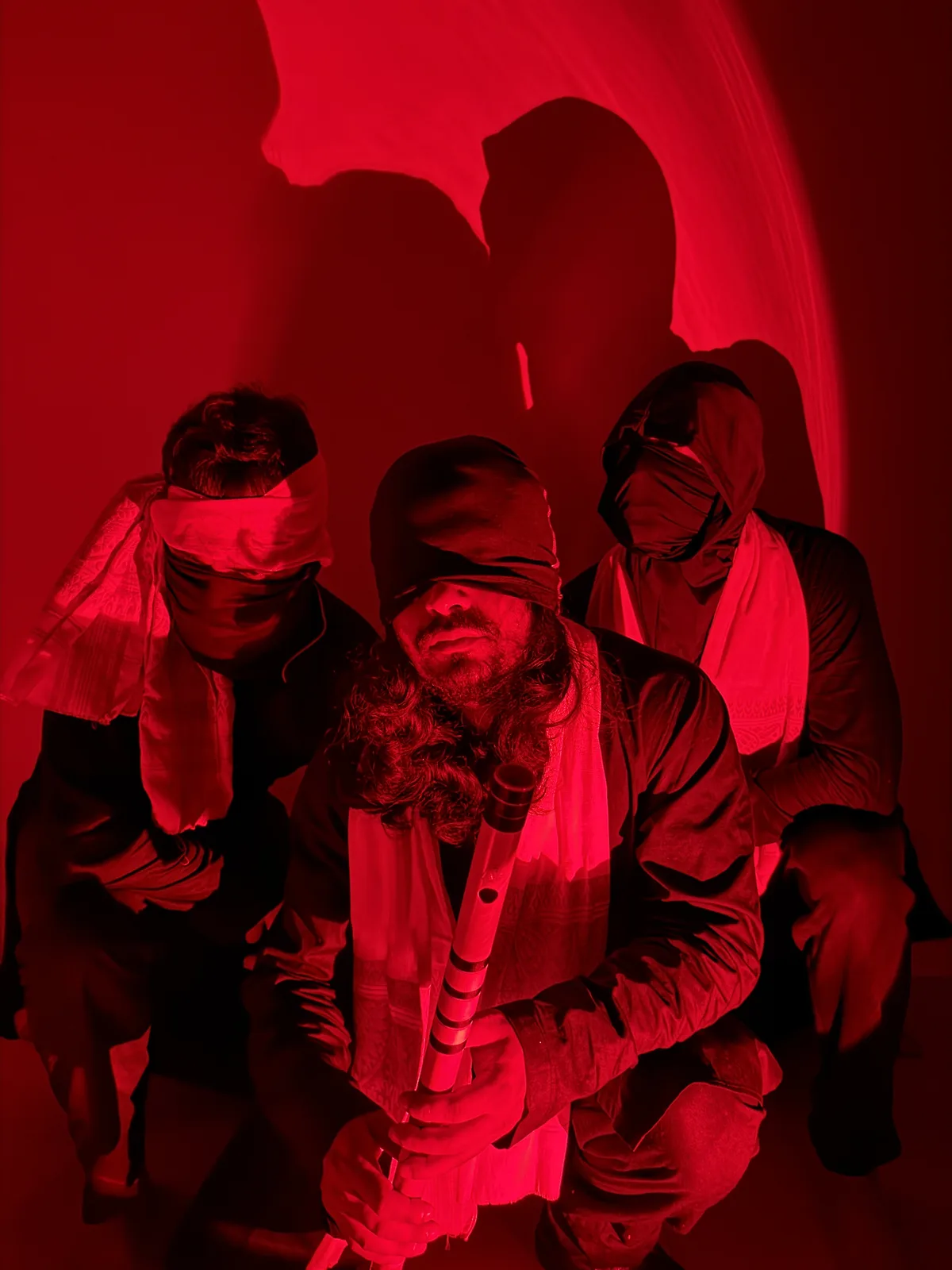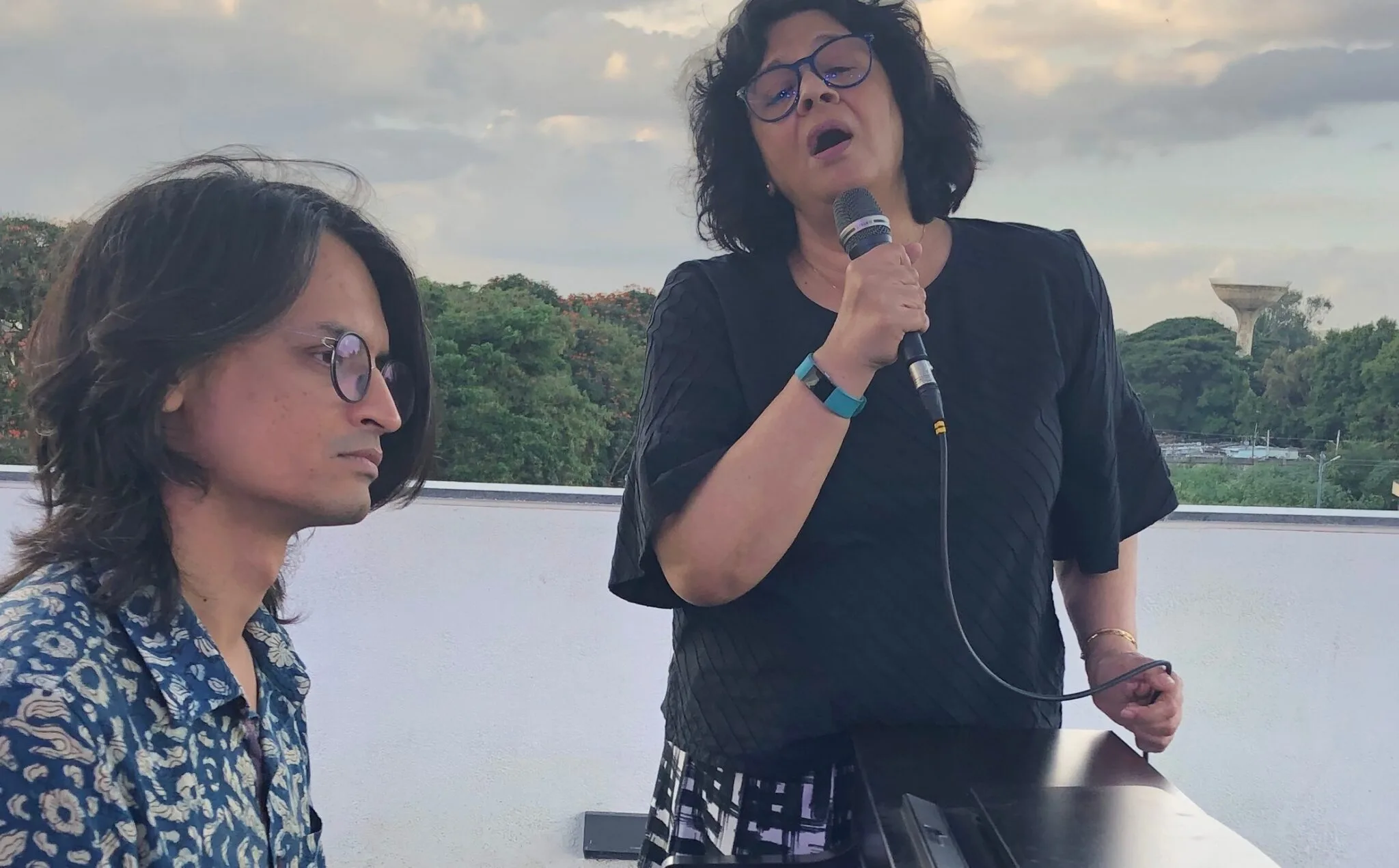If nothing else, we are all experiencing something frighteningly dystopian at this time. While we rest within the four walls of our houses, nature is busy birthing means of catharsis for mankind. It is in the cacophony of the birds, tingling drops of water, the whoosh of the air, and more. Music is omnipresent and the popular Bangalorean Jazz singer-songwriter Radha Thomas has only added to its eternal charm with her brand new album Bangalore Blues. Radha Thomas began her career when she started headlining as a singer, while still in her teens, in a rock and roll band called Human Bondage, which was India’s most popular band in the 70s. She soon developed a strong taste for jazz, which is her favourite kind of music. She also began combining the tonal complexities of jazz with the rhythmic nuances of Indian classical music.
The 7-track album is an ode to the city that Radha heartily calls home. Having collaborated with Berklee alumnus Aman Mahajan, she blends her vocal prowess and love for Jazz with Aman’s flair for playing the piano. Radha Thomas is trained in Hindustani classical music and is the frontman of UNK: The Radha Thomas Ensemble. They have been appointed by The Indian Council for Cultural Relations as the Indian government’s world-wide ambassador of jazz. The duo has been working together for the past 10 years. So, it is safe to say that the album is a treasure, nurtured by time and transformations. Recorded at Island City Studios by Jehangir Jehangir in Mumbai, India, and Mixed and mastered by Sebastian Ohmert, Sonic Impulse Studio in Berlin, Germany, October 2019, Bangalore Blues has a very interesting artwork done by cartoonist and chronicler of old Bangalore, Paul Fernandes, featuring the most memorable of city landmarks – the iconic Koshy’s restaurant and bringing nostalgia to the album, all the same.
Bangalore blues is as put by Mahajan, “a completely stripped-down piano and voice duet”. This 7 track album has a few tracks written by Aman, while the others have been written by Radha over the course of 6-7 years. The subtle appearance of Ragas in the album creates a soothing sonic impression with mridangam korvai. The tracks are well constructed and the lyrics thrive on human emotions, while the Piano complements the vocals. Thus, making the genre successful. Aman tastefully adds a touch of harmonies to the music while taking the composition to a level up with his crisp solos.
Bangalore Blues opens up with “Morning After” that conjures up an image of a city that never sleeps. The Indian melodic influences in the track bode well for the Jazz treatment in its music. The following tracks have a jazzy-waltzy feel to them with “Load Shedding” giving a bluesy touch to the album.
Bangalore Blues is one of a kind and for those who love a woman killing it with her sexy, raspy vocals, this one’s a treat. We managed to have a tête-à-tête with the lady herself and we were more than humbled with her genuinely welcoming aura and warm personality. A pocketful of sunshine, for sure.
Your new album was in the works for 10 years. Compared to now, did you notice a change in the way you make music?
It’s an interesting question and the first time some has asked me that. So it works like this. You write a song. And in the beginning since it’s new, you may experiment with the interpretations and arrangements, the formats and so on. But then it kind of falls into the right groove. Then after that, the more you perform it, the better it rightfully ought to get. And that’s what Aman and I were going for in Bangalore Blues.
The other thing is that we originally started off with a band. A six piece jazz band. Over the years, it’s been more and more difficult to travel and record with the entire band too expensive for the kind of money jazz musicians earn. Not to mention terrible sound equipment on stage etc. Aman and I naturally drifted towards an easier, simpler and more organic piano / voice format. We are very pleased with it.

You’ve been a writer and a jazz musician for years now. How has your experience been in the abroad as compared to that in India?
I started my musical career in India at a time when it was possible to play in a band full-time and earn a decent living, travelling from city to city and getting six month, or one year contracts in hotels. But that wasn’t enough because as a musician you keep wanting to reach out to more and more people.
I went off to America where it was exactly the opposite. I had to get a day job to be able to keep continuing to sing. I’ve been fortunate to work with some amazing musicians in both places and continue to be so. In America, I would say that I found it easier to break in than others because of the conscious decision I made to incorporate Indian music in my jazz. This made me slightly different from other singers in America. It helped me stand out a little.
These days, in India, I’m going back to jazz more than anything else and I love it. There are enough musicians who do the fusion thing… and I’m kind of happy not to.
What/who has been your constant inspiration in the field of music. Any suggestions for budding musicians in India?
Inspiration. Hmm. I keep digging inside for it. It’s like a beast that tells me, ‘Stop watching TV. Write a song. Write a poem. Write a book.’ I think inspiration and ambition are closely linked. When you are very young, you may look up to people to base your future on. But as you grow and develop as a human being, you have to rely on yourself.
Budding musicians better stay away from pesticides and figure out how to grow pure and organic.
Which one is your favourite song out of all in the album and why?
It’s a song called ‘Would I Lie For You’ which kinda goes back to your first question. I started writing it in 1975 I think. Anyway, it was way back. And at the time, I had zero confidence in myself. I put it away and forgot all about it. And after meeting Aman Mahajan, who is the closest thing to an inspiration I’ve ever come across, I heard all the rest of the song fall into place. Various bits from the past and present fell into the song and I love the way we do it.
Do you have any plans for a live India tour? If any, which is the one place that you’d like to perform most at and why?
Aman and I would love to bring this album and many other things we’ve written and worked on over the years around India.
When we perform in Bangalore, we see a growth in audience numbers. Concerts mainly, since the live bar / restaurant scene is all but shut down in this town. It’s not uncommon for us to fill up a 300 / 500 concert hall at all. And this is doing non-commercial, original music or which people are willing to pay to hear.
But let me be honest. For us to set up a concert tour where a listening audience could enjoy the music, we’d need some serious help. I would like to perform at NCPA in Mumbai and India International Centre in Delhi. There’s a very good reason for this. They usually like to promote foreign jazz bands and don’t care much for home grown stuff. These are marvellous venues and I believe we would do them justice.
A few years ago, the ICCR empaneled me as one of their jazz artists, the plan was to send us abroad to showcase Indian talent. Let’s see.
If you had one message to give to your fans, what would it be?
Thank you for listening. Thank you for coming to my concerts. And thank you for not throwing rotten eggs at me.





























